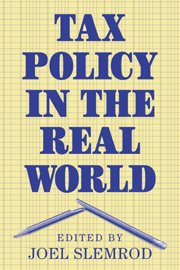Book contents
- Frontmatter
- Contents
- List of contributors
- 1 The real world of tax policy
- 2 Federal tax reform
- 3 Federalism and subfederal taxes
- 4 Principles, politics, and the professors
- Public finance in theory and practice
- On the use of ‘distribution tables’ in the tax policy process
- Taxation and economic growth
- Tax reform of the century – the Swedish experiment
- Measuring the impact of tax reform
- What is an ‘optimal’ tax system?
- How tax complexity and enforcement affect the equity and efficiency of the income tax
- Tax policy from a public choice perspective
- What is missed if we leave out collective choice in the analysis of taxation
- Public finance and public choice
- Professional opinions about tax policy: 1994 and 1934
- What can America learn from the British tax system?
- Peculiar institutions: a British perspective on tax policy in the United States
- Index
Public finance in theory and practice
Published online by Cambridge University Press: 01 June 2010
- Frontmatter
- Contents
- List of contributors
- 1 The real world of tax policy
- 2 Federal tax reform
- 3 Federalism and subfederal taxes
- 4 Principles, politics, and the professors
- Public finance in theory and practice
- On the use of ‘distribution tables’ in the tax policy process
- Taxation and economic growth
- Tax reform of the century – the Swedish experiment
- Measuring the impact of tax reform
- What is an ‘optimal’ tax system?
- How tax complexity and enforcement affect the equity and efficiency of the income tax
- Tax policy from a public choice perspective
- What is missed if we leave out collective choice in the analysis of taxation
- Public finance and public choice
- Professional opinions about tax policy: 1994 and 1934
- What can America learn from the British tax system?
- Peculiar institutions: a British perspective on tax policy in the United States
- Index
Summary
INTRODUCTION
Economists are accustomed to being asked questions they cannot answer. Policy analysts are accustomed to answering them. Academic research, with its often inconclusive findings, is not always well-suited to the needs of the policy process, which requires answers. As a result, the information and advice that policymakers receive often ignores valuable lessons that academic research, and indeed very basic economic reasoning, can provide.
The challenge to academic economists is to provide information that can be used by policymakers, without altering the message itself. Part of this process involves educating the “consumers” about the nature of economic research, to help them accept the fact that in some instances their question may have no clear answer or may in fact be the wrong question. Despite the limits to what economic theory and empirical evidence can tell us, there are often valuable lessons to be learned from the application of simple economic principles.
In this paper, I will try to illustrate the challenges facing economists involved in the tax policy process and some of the lessons we can offer using two issues of central concern, the measurement of the revenue and distributional effects of proposed tax changes. Each of these subjects is dealt with in considerably more detail in two recent publications of the Joint Committee on Taxation (1992, 1993).
- Type
- Chapter
- Information
- Tax Policy in the Real World , pp. 285 - 292Publisher: Cambridge University PressPrint publication year: 1999
- 1
- Cited by



